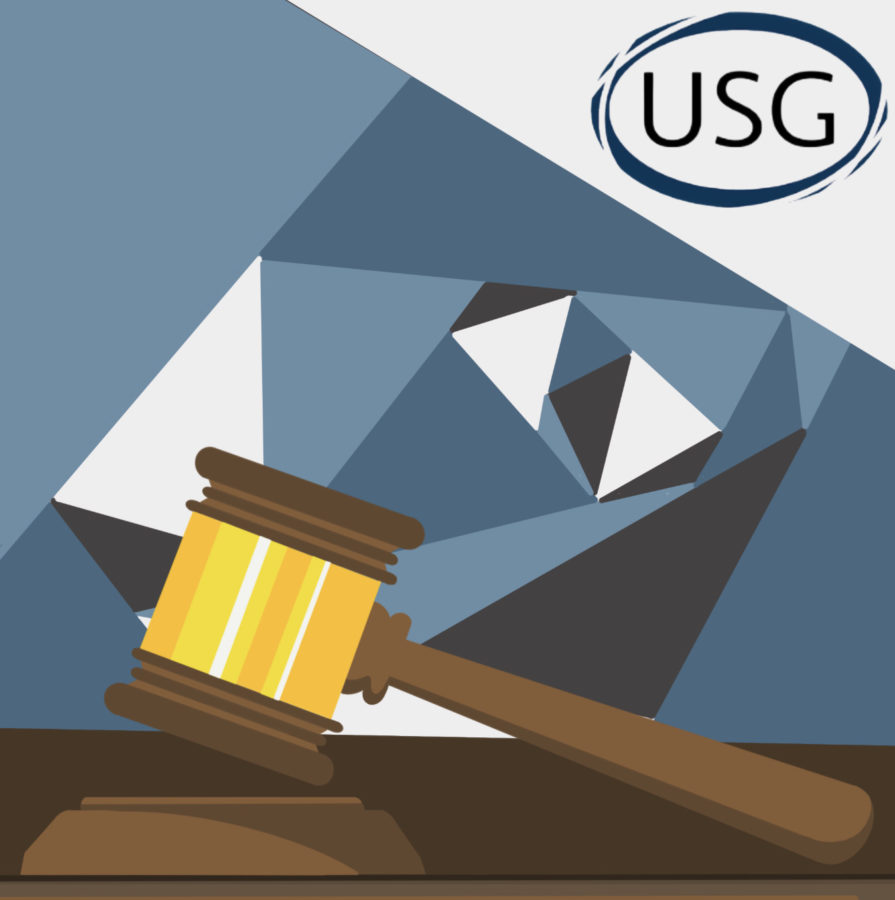USG’s “Students for Justice in Palestine” bill garners controversy
Resolution calls on CWRU administration to divest from Israel
November 4, 2022
The Undergraduate Student Government (USG) of Case Western Reserve University announced on Wednesday, Oct. 26 that they would be bringing Bill 31-15 to the floor on Nov. 8. They also noted that they would be shifting their General Assembly from Adelbert Hall to Tink Ballroom in order to accommodate an anticipated increase in attendance from the student body.
While CWRU students typically don’t pay too much attention to the bills and resolutions that USG regularly passes, Bill 31-15 has led to greater campus conversation and tension due to one simple fact: it deals with the ever-controversial issue of the Israel/Palestine conflict.
In 2021, USG Bill 30-01 successfully pressured the CWRU administration to divest its endowment in fossil fuel companies. Some students are now trying to use that model to call on the university to divest its assets that support the State of Israel, the military-industrial complex and the prison-industrial complex. Bill 31-15 is nicknamed the “Students for Justice in Palestine Bill,” as it was authored by the CWRU chapter of the pro-Palestinian college student activism organization Students for Justice in Palestine (SJP). The organization calls for the boycott and divestment of corporations that deal with Israel and highlights the Israeli government’s human rights violations.
A spokesman for SJP explained the reasoning of the bill by saying, “The divestment bill holds great significance to many students of [CWRU] that have strong sentiments against the military and prison industrial complexes of the world. [CWRU] is an institution that is dedicated to educating individuals from all around the world, enabling them to pursue their future careers. With that in mind, the acceptance and passing of this bill would allow the students of [CWRU] to rest easy knowing that their institution does not support for-profit war and apartheid.”
The origins of the bill is linked to the Boycott, Divestment and Sanctions (BDS) movement, which calls on individuals and organizations to economically pressure Israel to follow international law. The BDS movement began in 2005 and aims to mimic the tactics used to respond to the South African apartheid government in the late 20th century.
The bill, as such, begins by listing the various illegal acts committed by the Israeli state, such as the annexation and “military occupation” of Palestinian territory including the West Bank and the Gaza Strip and the building of settlements in annexed territory. The bill also argues that Israel is an “apartheid state” due to the mistreatment of Palestinians living under the Israeli government, citing examples including the blockade of goods to the Gaza Strip preventing adequate quality of life within the region, a justice system that detains and convicts thousands of Palestinians often without trial, a strategy of targeted extrajudicial killings against Palestinians, among others.
The authors of Bill 31-15 cite CWRU’s 2007 boycott of Sudan following the country’s humanitarian crisis and ethnic cleansing along with the university’s recent divestment from fossil fuel companies as precedents to follow. They also point out that student governments at peer institutions, including the University of Michigan, the University of Chicago and Stanford University, have called on their respective presidents and Boards of Trustees to similarly divest from companies supporting the Israeli state, though none of their administrations have actually done so.
The resolution calls on CWRU to investigate whether its endowment includes investments in companies within the military-industrial complex that provide weapons to Israel’s military, companies within the prison-industrial complex that operate private prisons that detains Palestinians and companies that support the illegal building of Israeli settlements within occupied land. If such companies are found to be supported by CWRU, the resolution implores the university to desist its investments and provide updates on its progress in the future.
While Bill 31-15 cites its sources regarding the illegal and often inhumane actions of the Israeli government as it builds its case for divestment, the resolution has faced resistance and contention from various corners of campus. Versions of this bill have been considered by USG since March 2018, but have been put on hold each time due to backlash from various students. Similarly, when this version of the resolution was presented to USG’s General Assembly on March 15, 2022, it faced immediate pushback.
First, CWRU confirmed that even if the resolution was passed by USG, the university would not follow through and divest from the aforementioned corporations. Second, there were fears that if the bill passed, instances of antisemitism would increase on CWRU campus. Several universities that passed passed similar bills saw an uptick of antisemitic rhetoric and activity on their campuses. There was also concern that the bill disproportionately blames Israel for the conflict. Proponents of the resolution pointed out that apartheid wasn’t something that required much nuance, and that an expression of morals by the student body was still important, even if the university didn’t follow through.
An anonymous second-year student during the March 15 General Assembly said, “First of all, we are talking about something very specific—apartheid. This is not someone’s opinion, it is an established fact in many international human rights groups. That is the discussion here: as a university, are we comfortable in supporting companies and organizations that support this?”
By the end of the spring 2022 semester, the resolution was neither passed nor rejected as USG representatives chose not to vote, so as to not take a side for the time being. It is instead being brought up again this semester, with hopes that its fate may be different this time around.
The Cleveland Hillel Foundation, which works to support Jewish students at universities across Cleveland, expressed concern about the bill and its contents. “Cleveland Hillel is deeply invested in promoting a welcome, respectful and inclusive campus community, and is gravely concerned that the boycott and divestment campaign and related resolutions aim to flatten all nuanced conversations about Israel into a ‘yes or no’ question. This breaks down the communal dialogue that the Hillel community is committed to upholding,” the organization said.
“Criticism of Israel, like criticism of any other sovereign country in the world, can be reasonable, legitimate and productive. Bill 31-15 is none of these and will only serve to negatively divide our [u]niversity and our student community, and could create a harmful environment for Jewish students. BDS campaigns can make students feel isolated, traumatized or attacked, no matter where you stand on the issue. We ask all members of the CWRU community to continue treating one another with respect and dignity.
“Hillel at CWRU stands firmly against BDS and related resolutions put forth to the USG because we stand firmly for a diverse, pluralistic community where people feel safe, supported and empowered to have the nuanced and respectful discussions that are a healthy community’s lifeblood.”
However, those on the pro-bill side directly counter these concerns, including the co-author of the bill, recent CWRU graduate Sam Bachelor, who states, “First, this bill is not a BDS bill, even though BDS should be supported, as their demands are more than sensible. This bill calls on [CWRU] to divest from the international for-profit military and prison industrial complex and does not single out the Israeli state … It calls on [CWRU] to divest from weapons contractors and private prisons that profit off crimes of the U.S., the Israeli state, Saudi Arabia and many other countries.”
Proponents of the bill have made the argument that this is different from a BDS bill and does not target Jewish students given its specific wording and goals. Professor Ted Steinberg, who works in the Department of History and advises the CWRU chapter of SJP, remarked that though the bill may not end up achieving its goals and could cause CWRU to actually divest, it still sparks useful conversation.
“Some people might wonder whether the university is the right place for this kind of activism. I would direct them to CWRU’s mission statement which cites ‘inclusiveness and diversity’ and, under that rubric, ‘civic and international engagement.’ This proposed resolution seems perfectly tailored to that vision,” Steinberg said. “We all owe the courageous students at SJP our thanks for raising awareness about the oppression of the Palestinian people, whose subjugation is too often swept under the rug.”
However, some students have expressed their concern that antisemitism is growing throughout the U.S. in the past couple of months. Given this, these students are concerned that a bill like this could exacerbate issues. A representative for Hillel at the March 15 USG General Assembly said, “I know this is not technically a BDS bill, but at schools that have passed BDS bills, groups such as Report Campus Hate have discovered increased antisemitism. I have experienced this, having gone to a Jewish school where kids from the public school came and threw things at us—that is a real form of hate.”
One Jewish student, who did not wished to be named, said, “There is a direct correlation with anti-semitism and a BDS bill or initiative on college campuses.”
Throughout the past several months, cases of students across the U.S. practicing antisemitic acts have grown, including students graffitiing antisemitic messages at University of Wisconsin in September and a student wearing an Adolf Hitler costume on that same campus over Halloween weekend. Beyond colleges, recent hateful comments by rapper Ye, formerly known as Kanye West, have spurred a growing culture of antisemitism, with banners being hung above a Los Angeles highway saying that “Kanye is right about the Jews.” With the fear of antisemitism only growing, some CWRU students are concerned that if this bill were to pass, it would only make it worse on our campus.
SJP claims that this is a non-issue, saying, “Although there has been backlash, with claims that the implementation of this bill would somehow increase antisemitism on campus, there is no evidence of this. On the contrary, it would give everyone on [CWRU’s] campus, regardless of religious affiliation or ethnicity, a chance to utilize their voice against such an evil industry.”
However, they also noted there was fear of reprisal on their end, as several of their members and various other CWRU students have been doxxed for supporting Palestinain causes in the past.
USG representative Jared Zullig, a second-year student at the time, acknowledged this during the March 15 General Assembly, saying, “That fear on both sides is important to acknowledge. As a Jewish student, it does make me nervous and it shouldn’t. That fear is what leads to the anger and the hate and creates a cycle.”
Whether this bill even comes to a vote at all this semester remains to be seen.
In an internal USG executive meeting on Oct. 11, USG President Ananya Hari expressed her wish for the bill to be withdrawn, saying, “We have this SJP bill, and no matter how we vote, [administration] is not gonna approve it and it’s creating a lot of division on campus. I am looking for a win-win situation out of this. Hillel students do not [want] this to pass because they are afraid of antisemitism on campus, and the SJP students want people in Palestine to be supported.”
She then went on to express that USG could potentially sponsor a fundraiser for humanitarian causes in Palestine instead, and that she “would ask [SJP] to hopefully withdraw this bill, and actually help people with [the fundraiser] rather than causing division and uproar on campus.”
The bill comes to the floor on Nov. 8 and students will be able to publicly provide comments before passage, though names will be redacted in the USG public minutes to prevent doxxing. The General Assembly will take place between 7-9 p.m. in Tink Ballroom.




